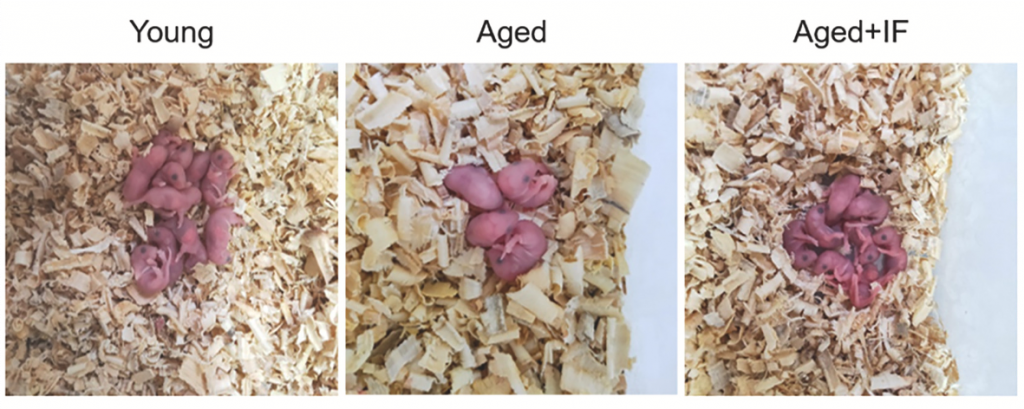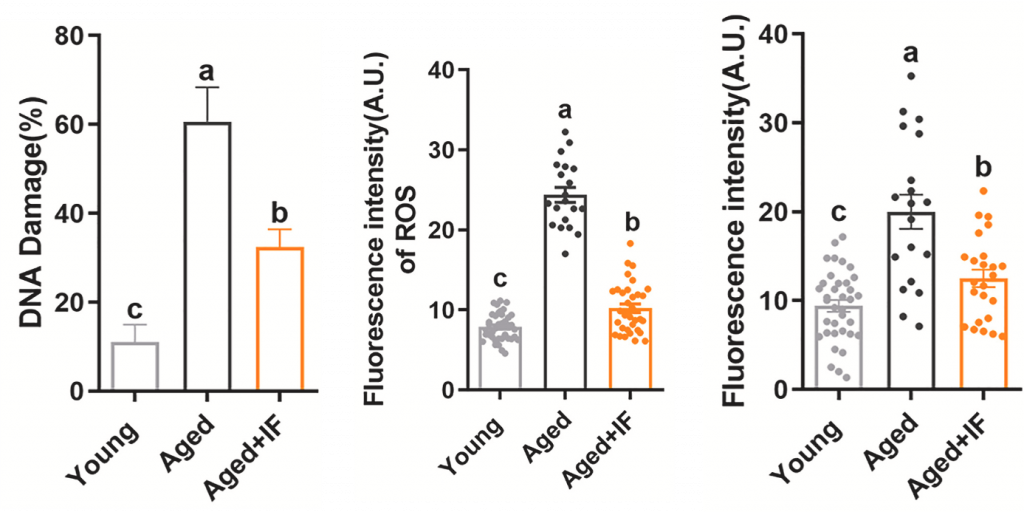Key Points:
- Intermittent fasting for one month improves egg quality and increases litter size in aged mice.
- DNA damage, cellular (oxidative) stress, and cell death are reduced in eggs following intermittent fasting.
- The benefits of fasting are mediated by increased NAD+, and sirtuins — longevity-associated cell survival enzymes.
Intermittent fasting (IF) is beneficial for numerous age-related conditions, including high blood pressure, cardiovascular disease, and diabetes. Now, a new study shows that IF can also increase oocyte egg quality, which naturally decreases with age and leads to decreased successful pregnancies in older individuals.
The study, out of China, published in Free Radical Biology and Medicine, focused on naturally aged female mice. Li and colleagues found that IF improves egg quality and increases mouse litter size. IF also reduces markers of DNA damage and cell death in aged eggs. The scientists found that many of these positive benefits are due to the restoration of NAD+ and sirtuins, which help eliminate accumulated reactive oxygen species (ROS) – highly reactive oxygen-containing molecules.
“These findings suggest that IF [intermittent fasting] is a feasible approach to protect oocytes against advanced maternal age-related oxidation damage and to improve the reproductive outcomes of aged females,” the researchers wrote.
Intermittent Fasting for Improved Egg Quality
Aged 58 to 60-week-old mice (approximately 65 in human years) were fed a normal diet or underwent IF. After one month, the aged mice that underwent IF had increased ovulation, and improved egg fragmentation – an indicator of egg quality. Furthermore, IF increased the number of pups per litter. Notably, IF did not improve the conception rate or the likelihood of getting pregnant in a given cycle.

Age-related DNA abnormalities are often linked to damage caused by excessive ROS – oxidative stress. Too much oxidative stress can lead to programmed cell death (apoptosis). IF was shown to reduce oxidative stress, DNA damage, and cell death, suggesting IF increases egg cell survival by reducing oxidative stress and subsequent DNA damage.

When mitochondria become dysfunctional, as with aging, they produce more ROS and less cellular energy – ATP. Nicotinamide adenine dinucleotide (NAD+), an essential mediator of cellular energy production, along with sirtuins, are known to improve mitochondrial function. The researchers found that NAD+, sirtuin, and ATP levels were increased by IF in aged eggs, suggesting that IF rejuvenates energy metabolism.
Furthermore, when the scientists experimentally prevented sirtuin functionality, IF no longer reduced DNA damage, ROS, and cell death. These findings demonstrate that these benefits of IF are mediated by sirtuins, which use NAD+ as fuel.

Intermittent Fasting and Delaying Aging
Aging science researchers have focused on the effect of IF or decreased calorie intake on health and longevity. Studies have shown that caloric restriction can reduce inflammation within our fat tissue, possibly leading to improved health. Other studies have shown that IF – basically an altered version of caloric restriction – can affect our healthspans, leading to healthier lives.
However, the cellular mechanisms behind the beneficial effects of caloric restriction and IF are still unclear. Some researchers show that low cellular energy levels via reduced caloric intake increase NAD+, in turn activating sirtuins, like SIRT1, which are known to play a role in repairing DNA and preventing cellular damage and death.
Li and colleagues show here that NAD+ and SIRT1, activated by IF, can help restore female reproductive capacity through increased egg quality as we age. With people choosing to start their families later, the ability to restore reproductive potential with something like diet could be of great help. More research is needed before IF can be proclaimed a cure-all for all age-related concerns, but the research is mounting in its favor.